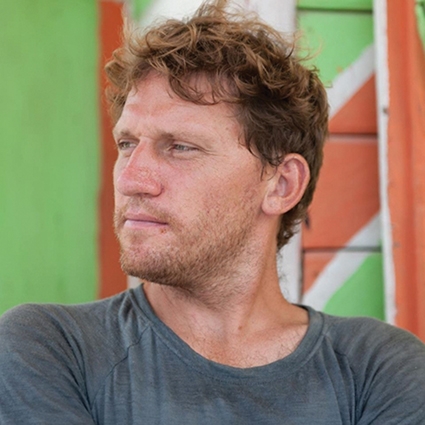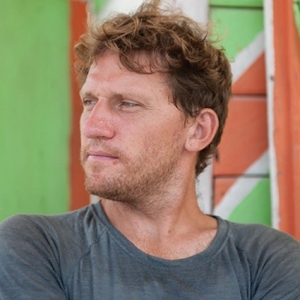Fritz Musser’s Family: It’s through Brokenness that We Hurt Others
Rebekah Friesen is a day program co-ordinator within a L’Arche community in Canada. In L'Arche, people who have intellectual disabilities and those who come to assist them share life and daytime activities together in family-like settings that are integrated into local neighborhoods. Rebekah is a calm, well-educated and well-spoken lady, with a deep understanding of the inherent good in people and the necessity of kindness and education to make the world a better place. But Rebekah is here in Tbilisi to witness the trial of her husband’s murderer. She also came to collect her husband’s belongings and to see what made Georgia, and the Caucasus, the place her husband had dreamed of exploring for the past 11 years.
Fritz Musser died on August 12, stabbed to death on a village road as he hiked alone to the Tusheti region as part of his top-to-tail Caucasus Mountain trail. The murderer was a 20 year old Georgian man who’d had a little too much to drink that fateful evening which ultimately ended in Fritz’s death. The young man, brought up by his grandparents in a small village, was quickly picked up by local police and confessed to the murder, aware that he could face the next 15 years in prison.
The trial last week took just one hour and the offender was sentenced to 11 years in a prison system which is young in its experience of rehabilitation. And Fritz’s widow sympathizes.
“I came not knowing what to expect. We’d been told that for a victim’s family to seek some sort of reconciliation with the accused and his family is very exceptional in Georgia, so we’d been told not to get our hopes up. When we arrived in the courtroom, we saw the offender’s grandparents and sibling were there. We exchanged smiles and I sat beside the grandmother the whole trial. There were a lot of tears on both sides. The grandparents had raised the boy and his sibling. They lost a son as I had lost my partner and Fritz’s family a son, brother, and uncle. We were humans sitting beside each other that day.”
The offender, Rebekah says, sat through most of the trial with his head in his hands. “He was emotional, his body language clearly saying: I can’t face the world. But I had the opportunity to speak to him, which they say is unprecedented in Georgia, and he expressed gratitude that we’d come and had been advocating on there not being a harsh prison sentence- rather that he’d have the chance to be out of prison and making positive changes in his life.”
“When Fritz went on these long trips, he often spent a lot of time ruminating on a topic or idea. This time he was thinking about what he could do when he returned to North America to make life better for people in prisons,” she says. “I've known Fritz for 9 years and as long as I've known him, he has been concerned with the well-being of incarcerated individuals. He believed humans are naturally good and don't want to hurt others, unless we have been wounded in spirit or not given the opportunities we need to live our lives well. Fritz felt prisons should be humane and respectful. They should reduce the chances that people would commit another crime, and they should give people the opportunity to reform their lives and heal their minds and spirits.”
In recent years, the Georgian government- the Ministry of Corrections, closely cooperating with various state institutions, non-governmental and international organizations, as well as the Ombudsman of Georgia, has taken significant steps to initiate reforms in the area of offender rights and restorative justice. It’s a work in process and it’s not clear how this young offender will benefit from it, which Fritz’s forgiving family clearly feels he should.
With tears in her eyes, Rebekah says she and Fritz’s other family members never felt angry about his murder - just sad, and very aware of their great loss. “We’ve been confused, sad, devastated, but not angry.”
Rebekah describes Fritz as a warm, caring, sensitive man, quick to respond emotionally to a video he saw or story he read. “And he was a gentle man- he’d walk by a playground and kids would run out asking him to play.”
She also describes him as insatiably curious and keenly intelligent. “I’ve never met anyone who had as many questions about everything as Fritz- he really wanted to learn about people and places and why they were the way they were. His mother says what an incredible gift he was because of how much he wanted to learn.”
Undoubtedly, it was that curiosity that lead him, after a long bout of unemployment and a short and sweet money-earner in Data-Entry and Research, to throw caution to the wind and pack his bag to fulfil an 11-year dream: to hike the length of the Caucasus Mountains.
“It was Georgia or bust. He’d spent four years living in Moscow and had travelled in the region. And he really fell in love with Georgia and its people. He even tried to recreate Georgian cuisine in the kitchen at home. He started his journey at the beginning of June in Azerbaijan- his feet in the Caspian Sea.”
A full-time job and people depending on her in the L’Arche community meant Rebekah was unable to join Fritz on his adventure, though it wasn’t through lack of desire to do so.
“I’ve been wanting to come to Georgia for years because of his interest. As a friend of mine said ironically the day before I was flying out, ‘I bet Fritz never thought he’d get you to do it so soon!’”
Her impressions since she arrived have been positive with regards both place and people.
I ask how positive her experience had been with those involved in the murder investigation and she claims the authorities were “very caring,” even showing concern on a personal level that this had happened. The process of investigation and getting Fritz’s body home went faster than expected, and his family and friends were able to hold a memorial service to celebrate his life within three weeks of his passing.
Some of his highschool friends began an online fundraising campaign with the aim of covering the costs of bringing Fritz’s body home and holding a memorial service. His family is still looking for ways to keep his story alive.
“Fritz was an incredible photographer and I’d really love to see an exhibition and maybe even a book published of his work,” Rebekah says. “He made some remarkable trips prior to this one- his photos were stunning, but he was quite private about things like that and didn’t publicize them. He had this most incredible selection of portraits of people he’d met on his travels around the world- just looking at those photos is a good descriptor of how people viewed Fritz because there was such incredible openness in their eyes as they looked into his camera.”
After the trial, realizing justice had been served in a punitive way, Fritz’s mother quite rightly wondered, “And what about me? I’m one of people most affected by the loss of Fritz; what about me?”
In Canada, for a crime of this level, Rebekah tells me restorative justice is not used, but for lower-grade crimes “Diversion from Prison” programs are in the developmental stage. “It’s about getting the victim, offender, and community together to support both sides. Then the victim and those affected (on an individual level) get a say what restitution is applied to the case. Some may see that as more punitive than having a judge, who is separate from the case, pronounce a judgement, but when you’re face-to-face with someone, it’s much harder not to view them as human.”
What she says next strikes a chord: “We need to realise that it’s out of brokenness that we hurt others. And so having the opportunity to sit with them allows you to work together towards healing some of that brokenness. This thought from Desmond Tutu has really sustained Fritz’s mom during this journey”.
She has high hopes this is a system that will kick off in Georgia- and she and some of Fritz’s family members want to reach out to the offender through the prison social workers to “have really open dialogue with him about what needs to change, what he can change, what assistance he needs in order to change, and where we can help him find that assistance.”
“From what we’ve heard of similar cases, an 11-year sentence was about average, so we were grateful,” Rebekah says of the final verdict.
The young man could have received up to 15 years but it was the family’s express desire that the sentence not be unduly harsh and that the offender not be made an example of for killing an American.
“Fritz felt that all humans, regardless of where they come from and what their situation is, or what they are economically or socially able to contribute to the world, should all be treated as equals,” Rebekah says.
Exclusive Interview By Katie Ruth Davies












